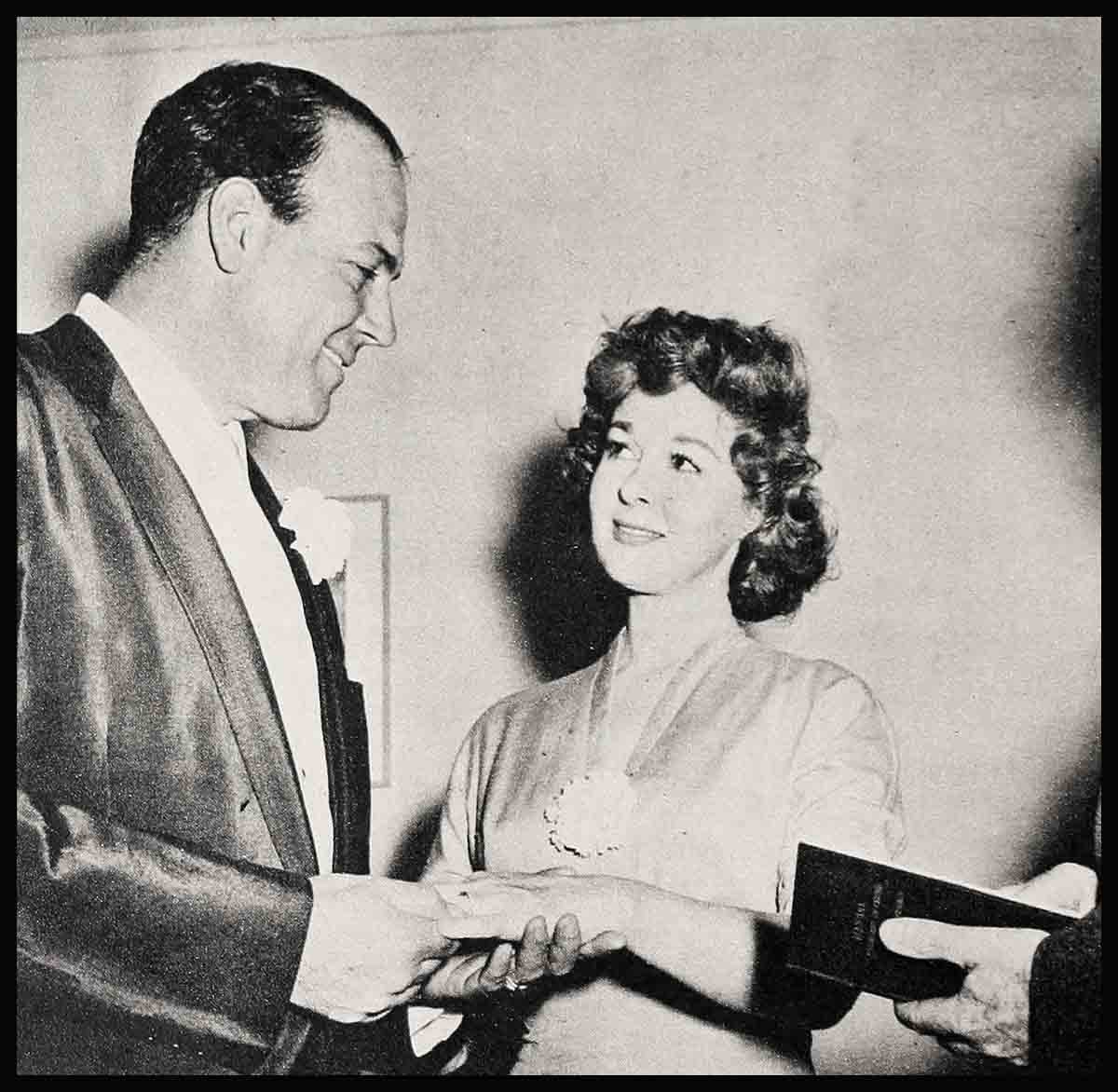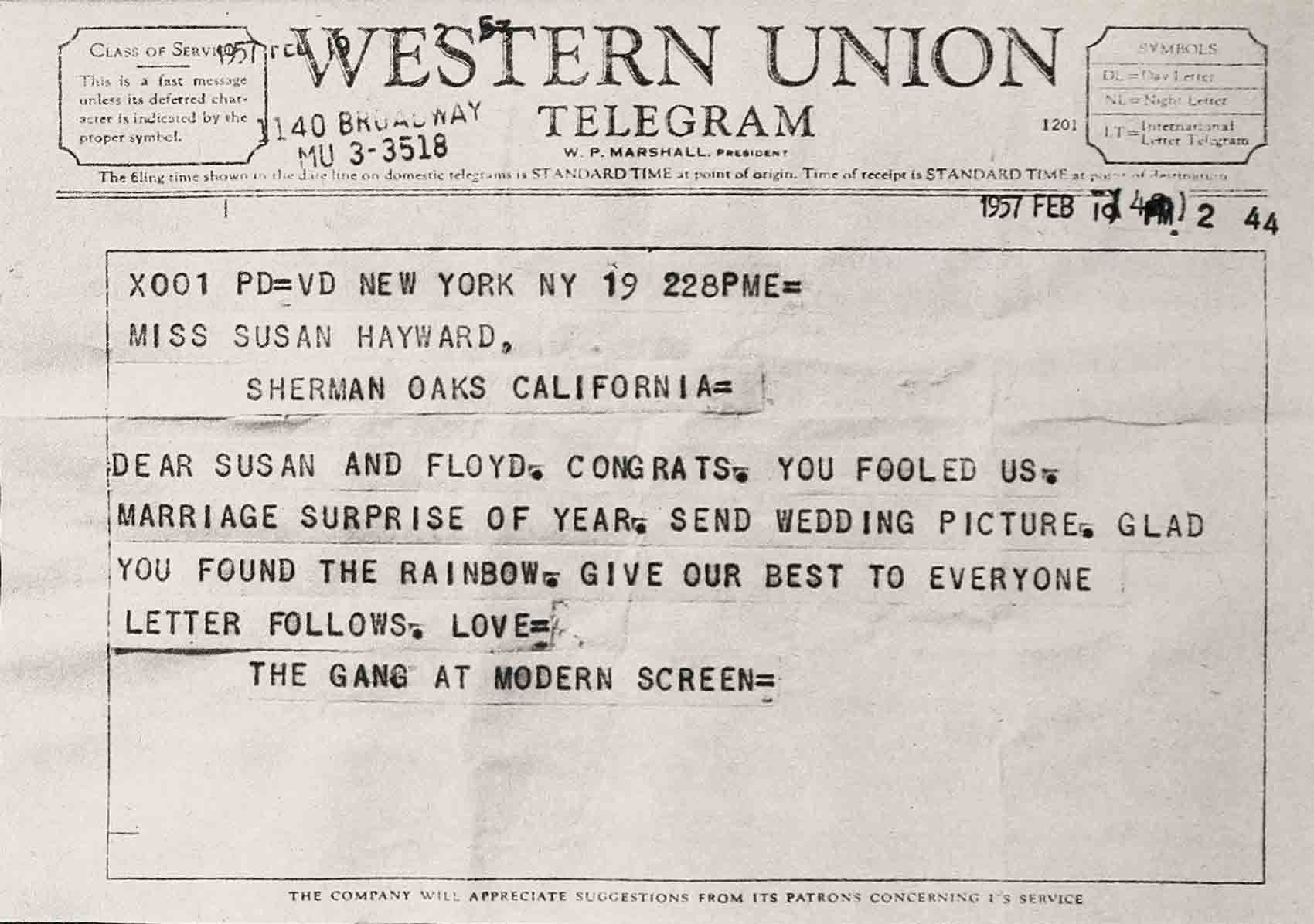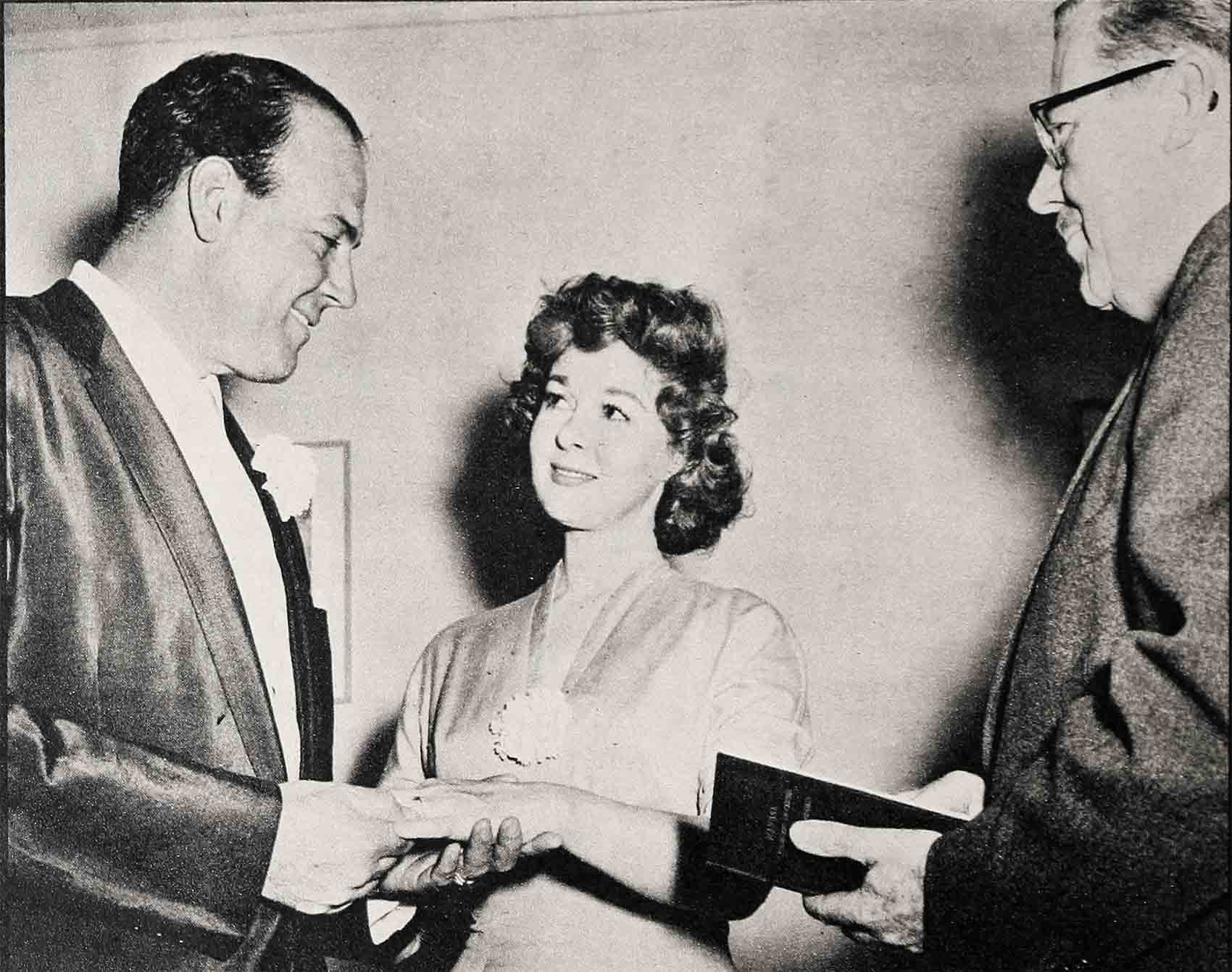
Thanks For The Picture, Susan Hayward-Here’s The Letter We Promised You . . .
Dear Susan,
Like the rest of the world, it was news to us—your marriage to Floyd Chalkley. And for once, we didn’t mind not knowing the inside dope on a Hollywood romance. I’ll tell you why a little later on.
We admit it . . . the first we knew about you and Floyd was when the Saturday papers flashed a picture of the two of you—a wedding picture. No items before that about the guy you met, started dating, fell in love with. Nothing in the gossip columns, nothing whispered along the Hollywood grapevine.
How you managed that, I’ll never know. But that you did do it—well, I guess I kind of feel like tossing my hat off to you for knowing that this was one thing in your life that you couldn’t have any publicity about. Because you’ve had too much of that. And all it’s brought you is the kind of misery that made life seem not worth living at all.
And you even tried to do that—stop living. It would be hard to believe—if I hadn’t seen the pictures myself, the pictures of a policeman carrying your unconscious body to an ambulance to be rushed to the emergency ward—and the headlines ACTRESS ATTEMPTS SUICIDE.
And everyone wondered why . . . why . . .
Because you’re one of the five most successful actresses in Hollywood. When you cash your salary check, the teller hands you $5,000—every week. The Cannes Film Festival voted you the best actress of the year. You’re famous on four continents, and have been presented to Kings.
Why did you want so desperately to die? Maybe because night after night, you sat alone in a beautifully decorated house that was empty. And the long lonely evenings blended into each other while you sat and waited for the phone to ring, for someone to call and ask if you wanted company or felt like a drive or could drop over for a few games of gin.
You must have stood in front of your mirror many times and tried to figure out how come some man—you knew enough of them—didn’t want to spend an evening with you. Or some friend care enough about you to call just to ask how you were.

You must have known the answer. Too many headlines about you, Susan, and too many people who are afraid of getting mixed up in the scandals that blasted your name across the country.
No, it really didn’t seem quite fair that you should have to pay such a high price for your mistakes.
Like that glass-breaking, name-calling, hairbrush-throwing battle with Jill Jarmyn over actor Don Barry when Jill came to Don’s home for breakfast—and found you there, wearing Don’s pajamas.
When the newspapers hit the stand, one prop man threw the paper on the floor and raged, “Why did it have to happen to Susan? Poor kid. Some of these actresses feel they’ve got to make every leading man fall in love with them—and there are some I could name who’ve split up half a dozen marriages. But Susan’s not like that. When she started working on I’ll Cry Tomorrow, she didn’t even look at Barry at first; he was just another actor. He was the one who courted her. He found out her favorite brand of cigarettes. After that he’d wrap a pack in gold paper and tie it with a ribbon and present it to her every morning. Then he started bringing her a single rose each day. And other little gifts. And Susan was lonely. How was she supposed to know he had a girl friend?”

And before that, the messy ending to your ten-year marriage to Jess Barker. You fell in love with Jess when both of you were just about half-way up the ladder to success. You bore him twin sons.
At first Jess’s career was equal to yours. But acting is a funny business. Maybe he didn’t have the right parts; maybe he wasn’t ambitious enough. As the years passed, Jess found it more and more difficult to get work. So he stayed home.
Maybe you could have made it easier for him, Susan—by choking your own ambition a little. Maybe it wouldn’t have made any difference. You won an Academy Award nomination for Smash-Up; his income dipped a little lower. You signed a new contract; Jess took the twins to the zoo.
In 1953 you were on top of the world.
And your marriage exploded in the sudden splash of your naked body into the swimming pool one midnight. It exploded in a sudden quarrel and a black eye—and charges and counter-charges, and months of spilling out your guts in court.
The newspapers carried all the details. And you sent your sons to a boarding school ‘somewhere up the California coast’ to protect them from being hurt.
And month after month you were alone—to think, to remember, to wonder why—until you couldn’t stand it any more. And there were the sleeping pills in the cabinet.
But you didn’t escape the scandal, the talk, the slander—it just started all over again, bigger than ever. Because, though you took the sleeping pills, you didn’t die.
No one will ever know what it cost you to face the press and the public when you left the hospital.
Every detail of the incident—the color of your pajamas (blue); the description of your discovery by detectives (“She was sprawled across the floor of her living room”); the word-by-word account of your first few hours in the hospital—had been spread across the newspaper headlines for three days to be devoured by hungry readers like the jam on their morning piece of toast. You knew that the reporters would be at the hospital but you didn’t sneak out of some back alley to avoid them. Instead, you fixed your face, dressed yourself in a pink polka-dot dress, and faced them. When the wheelchair stopped at the exit, you bounced out of it smiling and said, “I feel wonderful, and I didn’t lose any weight.”
You had a wardrobe fitting scheduled at the studio for the next morning. It would have been easier to stay at home, but you didn’t cancel the fitting. You walked into the office with your head high, paused for a moment, and threw out the words, “Good Morning” as you had always done. Then you turned around an walked slowly back to the fitting room.
I guess that’s the answer Susan. The answer to how you lived through those last desperate years. Only once did you lost the courage that made you fight for what you wanted—your career, your children. And now, your happiness.
Nobody knows exactly what it was is you that made Floyd Eaton Chalkley look at you and—finally—decide to stride across the whispers and the warnings. He knew about you, who you were and what your life had been, long before he ever met you. And it must have been hard for him to blot out the picture that the scandals drew. Or maybe, being an attorney, he was user to looking behind the evidence to discover truth. And he was strong enough to have faith in the woman he loved.
That’s why, Susan, we didn’t mind a all not knowing the inside dope on this Hollywood romance—with the happy ending. We’re glad you kept it secret until the love Floyd felt for you had time to grow and be strong enough to stand the glam of headlines repeating old tragedies.
Congratulations, Mr. and Mrs. Chalkley
Sincerely yours,
David Myer
Susan’s currently in Warners’ Top Secret Affair. Watch for her soon in 20t Century-Fox’s The Sun Also Rises.
It is a quote. MODERN SCREEN MAGAZINE MAY 1957




